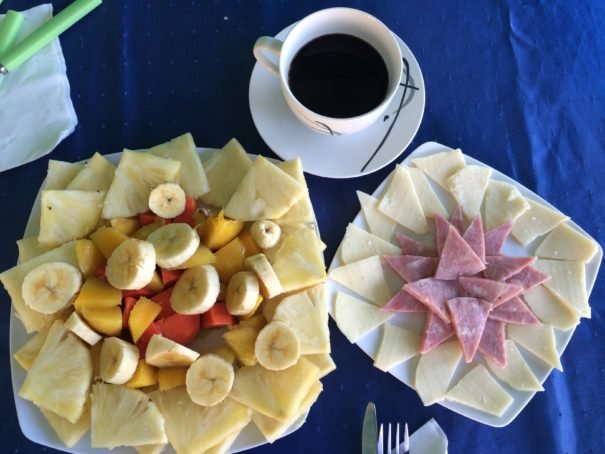
We’d Take a Cuban Cigar Soaked in Rum and Honey If Anyone’s Offering

We’d Take a Cuban Cigar Soaked in Rum and Honey If Anyone’s Offering
Fruit in Viñales, Cuba
The small town of Viñales is in Cuba’s westernmost province, Pinar del Río, where tobacco fields form a lush green skirt around the rugged, bubbling mountains that jut out of the red earth.
My father and I are staying in a wooden cabin that is modest but clean. Under the thatched palm roof, I’ve come to worship a revolving fan as a deity providing reprieve from the hounding heat.
Around us are the small cabins of the extended family of José Luis, a farmer from the Viñales Valley.
During the night, chirping tree frogs give way to the crowing of one very dominant rooster that in turn sets off a cacophony of birds, cows, and chatter that carries on throughout the day.
It’s 8 a.m. and we’re already sweating. Men in long-sleeve shirts, straw hats, blue jeans, and high rubber boots are already out guiding teams of oxen across the fields, braving the humidity.
Chickens, kittens, and family members mill about. One of José Luis’s sons hobbles by with a stitched and bandaged knee, the result of an early-morning machete accident.
China, José Luis’s wife, sets breakfast out for us on their patio attached to the main house on the farm. First to hit the table is a yellow thermos of coffee: thick, bitter, caffeinated and grown in the shade provided by banana trees on the ample property. A second thermos keeps warm the buttery milk, taken from their cows just a few hours earlier. A platter of fruit holds bananas (which grow here year-round), mangoes (freshly in season) and pineapple (from a plant a few feet from our table). There is also white bread and a guava marmalade.
China has a gentle smile and friendly eyes that squint in the perpetual sun. She asks us, “todo bien?” as she drops off a plate of fried eggs from the free-ranging hens that run around the farm. We’re stuffed to the brim as she brings us a platter of pungent, white cheese and cured salami cut into perfect triangles.
The freshness of the foods is what sets them apart. Everything tastes vaguely familiar, but pumped up to the highest degree of flavor. The bananas have a sweet punch, the mango is firm yet juicy, and the pineapple turns to liquid on my tongue. I feel, for the first time in a long time, like I am eating real food.
As we complete the generous presentation of the farm’s yield, José Luis approaches from the fields, loosely holding onto a cigar. He offers me one; I don’t typically smoke tobacco but … what the hell? I immediately taste sweetness.
“It’s the campesino secret,” he says. “We douse the dried leaves in rum, honey and cinnamon. You won’t find that in the stores.”
We’re smoking his reserves of the May harvest. He points to a triangular structure across the field. Known as a secador and made by weaving palms into its wooden skeleton, it is filled with drying tobacco leaves during the harvest. Government officials visit each independent farmer’s land to purchase the dried leaves whole at the price dictated by the powers that be. The campesinos are required to sell 90 percent of their harvest to the government, keeping the rest for their own private use or to sell. The government then takes the leaves to rolling houses, which employ mostly women, to create the cigars sold in government-regulated tobacco shops in tourist zones.
I puff the cigar as the heat intensifies and the flies begin buzzing with even more fervor.
“You have a nice place,” I tell José Luis.
With a smile, his eyebrows twitch as he takes a long toke of his cigar.
“I used to work for other people, on another farm. Every day my boss would be ordering me around; I had to do everything as I was told. Now, I still do it all, but I do it all for my family.”
We sit for another minute in silence, when suddenly he jumps up off the ground where he’s been resting, kisses me on the cheek and with his lanky jog, runs to greet a neighbor passing by on his horse.
The day’s work won’t be finished until well after sunset. And while there’s always work to be done, it appears there’s also always time to stop for a puff of tobacco and good conversation.